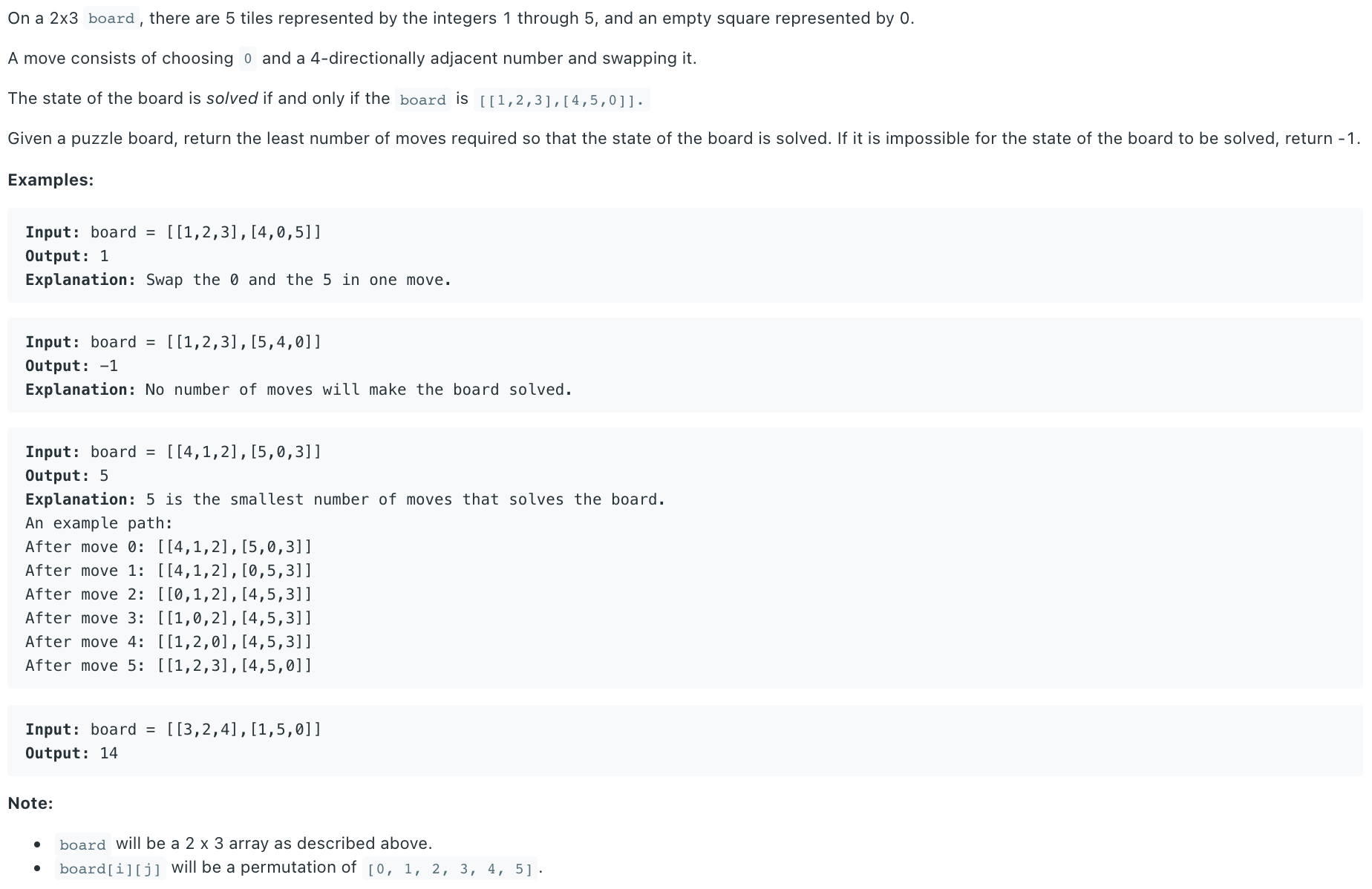Sliding Puzzle
franklinqin0 BFSImplicit Graph

# Input & Output
@param board: the given board
@return: the least number of moves required so that the state of the board is solved
1
2
2
# Solution
Let be the number of rows and be the number of columns of the board.
# Complexity Analysis
Complexity
time:
space:
The number of possible states of the board is . This is because there are elements and you can choose one of the elements for the first position, one of for the next position . The search algorithm may visit every state once. It may do better, but big is an upper bound. The multiplier of nm is because to move from one state to the next makes a copy of the board, which takes time.
# Layered BFS
DIRECTIONS = [(-1, 0), (1, 0), (0, -1), (0, 1)]
TARGET_STATE = "123450"
def slidingPuzzle(self, board: List[List[int]]) -> int:
start = self.matrixToString(board)
queue = [start]
vis = set()
res = 0
while queue:
for _ in range(len(queue)):
state = queue.pop(0)
if state == TARGET_STATE:
return res
for next_state in self.getNext(state):
if next_state not in vis:
vis.add(next_state)
queue.append(next_state)
res += 1
return -1
def matrixToString(self, state_mat):
state_str = ""
for i in range(2):
for j in range(3):
state_str += str(state_mat[i][j])
return state_str
def getNext(self, state):
pos = state.find('0')
x, y = pos // 3, pos % 3
next_states = []
for dx, dy in DIRECTIONS:
nx, ny = x + dx, y + dy
if 0<=nx<2 and 0<=ny<3:
npos = 3*nx + ny
mn, mx = min(pos, npos), max(pos, npos)
nstate = state[:mn] + state[mx] + state[mn+1:mx] + state[mn] + state[mx+1:]
next_states.append(nstate)
return next_states
1
2
3
4
5
6
7
8
9
10
11
12
13
14
15
16
17
18
19
20
21
22
23
24
25
26
27
28
29
30
31
32
33
34
35
36
37
38
39
2
3
4
5
6
7
8
9
10
11
12
13
14
15
16
17
18
19
20
21
22
23
24
25
26
27
28
29
30
31
32
33
34
35
36
37
38
39
Or more succinctly, using tuple rather than str to encode board:
def slidingPuzzle(self, board: List[List[int]]) -> int:
n, m = len(board), len(board[0])
start = tuple(itertools.chain(*board))
queue = [(start, start.index(0))]
vis = set()
end = tuple([i for i in range(1, n*m)] + [0])
res = 0
while queue:
for _ in range(len(queue)):
board, pos = queue.pop(0)
if board == end:
return res
for d in (-1, 1, -m, m):
npos = pos + d
# ensure only move by 1 in any direction
if abs(npos//m - pos//m) + abs(npos%m - pos%m) != 1:
continue
if 0 <= npos < n*m:
nboard = list(board)
nboard[pos], nboard[npos] = nboard[npos], nboard[pos]
nboard = tuple(nboard)
if nboard not in vis:
vis.add(nboard)
queue.append((nboard, npos))
res += 1
return -1
1
2
3
4
5
6
7
8
9
10
11
12
13
14
15
16
17
18
19
20
21
22
23
24
25
26
27
28
2
3
4
5
6
7
8
9
10
11
12
13
14
15
16
17
18
19
20
21
22
23
24
25
26
27
28
# A* Algorithm
, where is the estimated distance (priority), is the actual distance travelled from start node (depth), and is the heuristic distance to the end node.
from heapq import heappush, heappop
from collections import defaultdict
def slidingPuzzle(self, board: List[List[int]]) -> int:
n, m = len(board), len(board[0])
start = tuple(itertools.chain(*board))
pqueue = [(0, 0, start, start.index(0))]
vis = set()
end = tuple([i for i in range(1, n*m)] + [0])
end_wrong = tuple([i for i in range(1, n*m-2)] + [n*m-1, n*m-2, 0])
cost = defaultdict(lambda: sys.maxsize)
cost[start] = 0
expected = {(m*i+j+1) % (n*m): (i, j) for i in range(n) for j in range(m)}
def heuristic(board):
h = 0
for i in range(n):
for j in range(m):
val = board[m*i + j]
if val == 0: continue
ei, ej = expected[val]
h += abs(i - ei) + abs(j - ej)
return h
while pqueue:
f, g, board, pos = heappop(pqueue)
if board == end: return g
if board == end_wrong: return -1
if f > cost[board]: continue
for d in (-1, 1, -m, m):
npos = pos + d
if abs(npos//m - pos//m) + abs(npos%m - pos%m) != 1:
continue
if 0 <= npos < n*m:
nboard = list(board)
nboard[pos], nboard[npos] = nboard[npos], nboard[pos]
nboard = tuple(nboard)
nf = g + 1 + heuristic(nboard)
if nf < cost[nboard]:
cost[nboard] = nf
heappush(pqueue, (nf, g+1, nboard, npos))
return -1
1
2
3
4
5
6
7
8
9
10
11
12
13
14
15
16
17
18
19
20
21
22
23
24
25
26
27
28
29
30
31
32
33
34
35
36
37
38
39
40
41
42
2
3
4
5
6
7
8
9
10
11
12
13
14
15
16
17
18
19
20
21
22
23
24
25
26
27
28
29
30
31
32
33
34
35
36
37
38
39
40
41
42